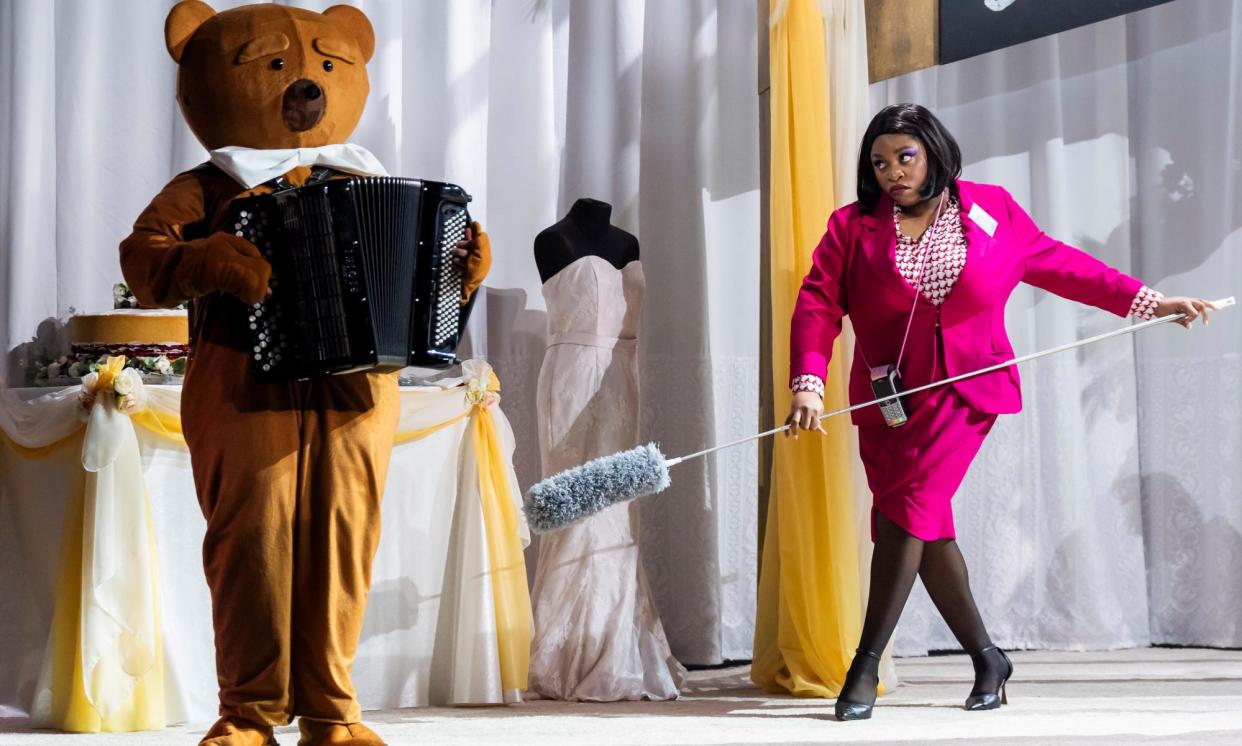Larmes de Couteau/Full Moon in March review – two supremely weird operas

In an evening where little was obvious, it was definitely a bad night for teddies. One had its head torn off as the violent accompaniment to a coloratura tour-de-force. Moments earlier, the backdrop had parted to reveal an entire wall of mutilated bears, clumsily taped back together. And, in one of the most disturbing moments of all, a human-scale teddy wandered on playing an accordion like a cameo in a horror film, before eventually removing its own oversized head to pick a fight with one of the singers.
Confused? I was, repeatedly, in these extraordinary performances of two supremely weird operas. The bears themselves were the work of directors Eleanor Burke and Harriet Taylor, who staged Bohuslav Martinů’s 1928 Larmes de Couteau and John Harbison’s 1977 Full Moon in March – the former as a kind of strip-lighted nightmare whirlwind of wedding cake, mannequins and that bear-accordionist; the latter as a differently nightmarish, highly stylised post-tonal sitcom unfolding around a four-poster bed.
The real weirdness, needless to say, was hard-baked into each piece long before these stagings added neon accessories and boundless physical energy. Both are rarities – ROH director of opera Oliver Mears staged the Martinů’s UK premiere himself back in 2007, while this is only the second UK production of Harbison’s chamber opera – and you can see why. The sequence of events in Larmes de Couteau is somewhat clearer, albeit in an explicitly surreal vein (“It’s very French, isn’t it?” said the woman sitting next to me to her companion come the interval). The plot of Full Moon in March, meanwhile, made sense on paper (a quest piece involving a swineherd as the wannabe suitor of a queen) but in performance the libretto – adapted from a WB Yeats play – verges on impenetrable.
In these circumstances, the miracle of this double bill from the Royal Opera’s Jette Parker Artists was how intensely gripping it was. The singing was superb throughout. Soprano Valentina Puskás was compelling as Martinů’s Eleonora (a woman whose mother is trying to marry her off to Satan) but genuinely hair-raising – the coloratura tour-de-force was hers – as one of the two Attendants in Full Moon. The other, tenor Jonah Halton, was vocally lucid and dramatically commanding. Mezzo Veena Akama-Makia was disturbing as Harbison’s Queen and almost funny as Martinů’s appalling Mother, her controlled vibrato mesmerising. As Martinů’s Satan and Harbison’s Swineherd, baritone Edmund Danon pulled off both slapstick physical comedy and an impassioned quasi-mad scene. In the pit, the Britten Sinfonia under Jette Parker conductor/repetiteur Edward Reeve was at its best in Martinů’s vivid score – Stravinsky meets honky-tonk piano, plus prominent banjo – where angular solo lines were deeply cut, their crisscrossing occasionally slipping into Jazz Age dance numbers.


